New survey shows changing role of women on farms
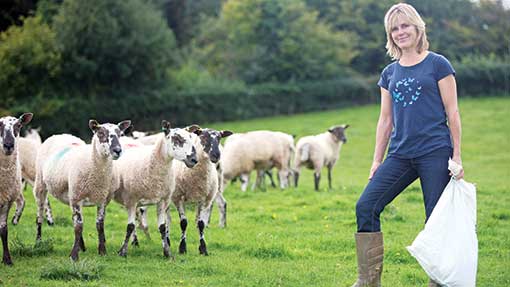
A new survey has given a unique insight into the working lives, aspirations and outlook of women on British farms.
Women are incredibly optimistic about the role they will play on farms and in shaping UK agriculture over the next decade.
That’s one of the key messages from a Farmers Weekly and Barclays survey, in which more than 2,000 male and female respondents shared their views on the role of women on farms around the country.
Have your say
Surprised by the findings? Got a view you’d like to share? We’re keen to hear reaction from men and women to these results and will publish a selection of your comments. Email your opinions to fwfarmlife@rbi.co.uk or comment on our forum.The research, the biggest ever conducted in this area, reveals much has clearly changed compared with a generation ago, with only 4% of women considering it harder for females entering the industry now compared with when they joined. Additionally, about two-thirds of women suggested that in terms of pay, benefits and daily work routines, they’re treated “mostly” or “always” equally to men.
Across men and women, 59% suggest agriculture is either the same or better than other industries in terms of offering equal opportunities – and when asked to predict what the situation would be like in 10 years’ time, this figure rose to 87%.

The survey showed women to be involved in a huge array of activities – more than two-thirds undertook practical farm duties, with them tending to focus more on livestock and youngstock work than their male counterparts. Field operations (both arable- or livestock-related) remain a male-dominated area – of the women involved in practical farm duties, just 28% regularly undertook arable field operations, whereas among the men the figure was 72%.
Many women felt they shouldered the burden of paperwork, admin and domestic duties. “The males in our farm business don’t do any paperwork – record-keeping, bookkeeping, financial or farm administration. All the daily routine outdoors work (with the exception of lambing and blood-testing or dosing cows) is done without reference to me,” one said.
Another commented: “I have to allow time in my routine to cook three meals a day, which limits what jobs can be done and the boys never have to cook, unless I am away.”

Many women clearly still see themselves playing a “supportive” role – a lot suggested they were “influencers” rather than the “final decision maker” in the business.
They’re also more likely to take off-farm work, often to support themselves or the farm business and are more likely to have higher general qualifications (nearly one-third have a degree) than their male counterparts (who may have more practical or vocational qualifications).

The survey highlighted that some areas have changed less than many would like, with 61% of women considering themselves “rarely” or “never” treated equally when it comes to succession. One respondent said: “Farmers prefer to give land to their sons to ensure the farm remains within the family and carries on the family name.” Another commented: “Even competent daughters and daughters-in-law are overlooked by seniors.”
Marriage, meanwhile, remains the main route into farming for 25% of women, while it’s only the case for 2% of the men.
Despite the progress many alluded to, “industry attitude” was cited as the second biggest obstacle prevnting women from achieving their career goals in agriculture – “commitments to children” was seen as the principal factor.
Across both sexes, however, the single biggest factor cited as holding back people having more influence on a farm was “parent”, prompting some to suggest that there was a “generation rather than a gender divide”.

Overall, there was a high tendency among respondents to recommend the sector as a career to young people. Comments such as “it’s a fantastic way of life”, “the opportunities are there if you want them” and “I went into farming at 17 and it was the best decision I ever made” frequently appeared.
It was also noticeable that the level of positivity between the sexes varied, with women more likely to recommend it as a career and be passionate advocates for the sector.

Men, conversely, were more likely to act as “detractors”, at times discouraging youngsters from choosing it as a job. It’s been suggested that the long working hours, the at-times poor financial returns and the weight of decision-making responsibility they’ve traditionally borne could be a contributory factor to this.
Physical ability is still cited by nearly half of respondents as an issue for women in agriculture.
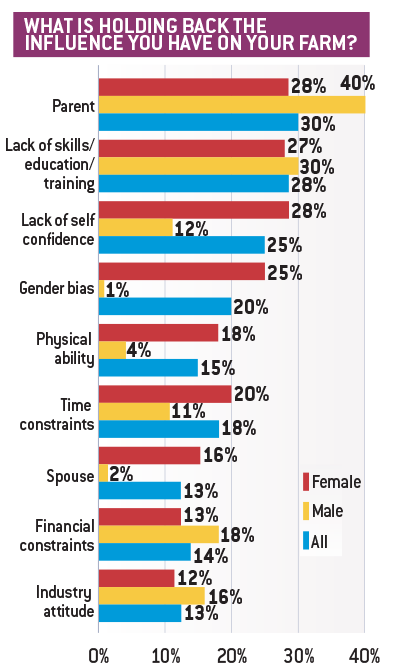
Among those who regularly undertake practical duties, 25% of women do milking, whereas it’s only 16% of the men.
Reaction to the survey
Elizabeth Elder, Northumberland farmer
 It’s much easier for women to enter farming now than when I was younger. Girls were actively discouraged from looking to farm themselves when I was at school and that isn’t the case now. Similarly, I don’t think there is as much pressure/expectation on boys to stay in farming. Perhaps freeing the boys has created opportunity for the girls.
It’s much easier for women to enter farming now than when I was younger. Girls were actively discouraged from looking to farm themselves when I was at school and that isn’t the case now. Similarly, I don’t think there is as much pressure/expectation on boys to stay in farming. Perhaps freeing the boys has created opportunity for the girls.
I am not surprised that succession is seen as the area where there is the most inequality. For most farming families, plan A has always been that the father will be succeeded by his son. Complications only arise when there is no son, more than one son or there is a son who is uninterested in farming. In terms of recommending young people to go into farming – the key for me is not their gender but their enthusiasm. There is only any point doing it if you enjoy it. If you do enjoy it, it can be a great career choice.
Anna Longthorp, Yorkshire pig farmer
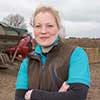 The world’s growing population has meant – and will increasingly mean – that more food will be needed which will generate more career opportunities in agriculture.
The world’s growing population has meant – and will increasingly mean – that more food will be needed which will generate more career opportunities in agriculture.
These will cover a wide range of areas and require many different skills, also making it more attractive to women.
The way technology has developed means many aspects of the job aren’t as labour-intensive as they used to be. There’s still plenty of manual work, but the increased automation means the job is more attractive to – and has lower drop-out rates for – women. Feminists can argue as much as they like but, on the whole, men are physically stronger.
It will probably mostly be men who own farming businesses and therefore hold the purse strings, so ultimately make the final decisions. Because of this, women will probably find the best way to steer the business in the way they see fit is to try to influence those decisions. Women can be very good at steering a man into thinking that something is his idea and therefore making the decision the woman wants by asking the right questions (although my dad does this to me so it works both ways).
Minette Batters, NFU deputy president
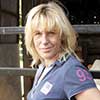 There are many more women coming into agriculture, judging by the number in agricultural colleges and universities. There are also many more opportunities to be involved in farming-related businesses and the wider industry that don’t mean you have to acquire land – science and retailing, for example. We also see many more women doing two jobs.
There are many more women coming into agriculture, judging by the number in agricultural colleges and universities. There are also many more opportunities to be involved in farming-related businesses and the wider industry that don’t mean you have to acquire land – science and retailing, for example. We also see many more women doing two jobs.
Women have played a key role in many diversification projects (often they’ve been essential for farming businesses to survive), as well as being the backbone of traditional farming practice. I am not a bit surprised that the survey shows them to be very optimistic about the future.
I’m not so sure that the role of women has actually changed that much (the ones I know are still juggling running a family and home, alongside the farming business). It’s more a case that society as a whole is far more encouraging of them working. So whereas when I was growing up, my mother was very hands-on but very much in the background (although she definitely had a say in what happened), now it’s very common to see women on their own at farming meetings and on industry boards. This is taking time, but it is happening and adds enormous value.
Many of the farmers I speak to are delighted that their daughters are wanting to come into the business, but succession remains a problem for both sexes. The situation has improved over the past 10 years, however, and will continue to do so.
As far as work routines, pay, benefits and influence goes, this area has seen a massive change in the past decade. Women are beginning to take some of the very top jobs – Helen Woolley, director general at the CLA, Christine Tacon, the groceries code adjudicator, and LEAF chief executive Caroline Drummond, for example. They were not appointed because they were women, but because they were the best people for the job.
Helen Woolley, CLA director general
 The careers of many men and women in the sector have been shaped by confidence and belief in their own abilities rather than what sex they are – I have never found gender to be an issue in my career.
The careers of many men and women in the sector have been shaped by confidence and belief in their own abilities rather than what sex they are – I have never found gender to be an issue in my career.
There are many academic studies over the past 20 years that suggest a lack of self-confidence can hold women back, but this is not to say women do not have significant influence on farms. Undoubtedly, influence will play a key role on the final decision, irrespective of who makes it.
Sally Jackson, Lincolnshire farmer and chairman of Farma
 The traditional role of women is changing fundamentally. Most still provide the majority of childcare and household support, however as this balance shifts, women are becoming more involved in decision making. We may not always make the “ultimate” decision but you can bet it has been discussed over breakfast first.
The traditional role of women is changing fundamentally. Most still provide the majority of childcare and household support, however as this balance shifts, women are becoming more involved in decision making. We may not always make the “ultimate” decision but you can bet it has been discussed over breakfast first.
As more women come into the industry, the final decision-making gender balance will reflect this. I am not surprised that the technical decisions are left to men – give me a nicely designed chiller-cabinet over a tractor any day.
Many women are already succeeding at the top of the industry by using brain power rather than brawn and influencing the future of farming.
Gender is really not an issue if women don’t see it as one.
Lack of self-confidence scored much higher in women than men. This is what needs addressing. Our mum taught us to believe that we could do anything. I find it depressing that women feel that a man is holding them back. Come on girls… persuade them otherwise!
As for the succession issue, Malcolm Muggeridge said: “Few men of action have been able to make a graceful exit at the appropriate time…” So true. Perhaps after we have educated our children, we need to trust them to get on with it.
Jenny Stratford, Women’s Food and Farming Union president
 I am very optimistic about the role for women in the future, but that would not have been the answer 20 years ago. Now women are treated like equals from childhood so are far more confident about their ability to succeed and be accepted and gain respect in doing so. The fact that women provide more of the domestic support isn’t a big issue. Women are natural home-makers and they understand that these areas form the solid foundation for work, pleasure and family. Yes, they multitask – they are experts in this field, as they are in others. I do not see “domestic” areas as traditional. It is what women do, as well as all the rest.
I am very optimistic about the role for women in the future, but that would not have been the answer 20 years ago. Now women are treated like equals from childhood so are far more confident about their ability to succeed and be accepted and gain respect in doing so. The fact that women provide more of the domestic support isn’t a big issue. Women are natural home-makers and they understand that these areas form the solid foundation for work, pleasure and family. Yes, they multitask – they are experts in this field, as they are in others. I do not see “domestic” areas as traditional. It is what women do, as well as all the rest.
Bobbi Mothersdale, Yorkshire farmer
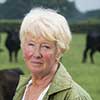 Traditional roles are being eroded. It’s not always the case that sons only take on the farm operations. Smaller families are now the norm and most children are going on to further education so can access other well-paid employment opportunities (possibly agriculture-related), which means openings are there for women to take on the farm.
Traditional roles are being eroded. It’s not always the case that sons only take on the farm operations. Smaller families are now the norm and most children are going on to further education so can access other well-paid employment opportunities (possibly agriculture-related), which means openings are there for women to take on the farm.
It’s interesting that admin is still seen as very female-centred. They can frequently bring in skills from other roles – they can be innovative and bring IT approaches to managing this, especially where now this is the only acceptable communication with, for example, PAYE and VAT.
Overall, however, as well as being an asset for her financial contribution, a farmer’s wife needs to be a time-traveller because of the requirement to be in the farm office and kitchen, the garden, to child-mind, child educate, be an IT expert, a taxi service and general gofer, plus, of course, being a lovely, gracious companion – all at the same time.
Banking on women
Barclays have built up a specialist agricultural team, consisting of 100 agricultural managers across the UK that have advised and supported farmers for more than 250 years. We have always been strongly committed to rural communities and we undertook this research with Farmers Weekly to help us dig deeper into the real issues and challenges that currently face females in the farming industry.The value of women and the impact they have in the agricultural industry is huge. The number of women involved in UK farming has been growing over recent years, and we anticipate it will continue to rise.
You only have to look back two or three decades to see that most agricultural work involved hard, heavy labouring. The advances in machinery and technology have changed the way many farms now operate. Tasks that once took a full day and several people can now be done far more quickly and efficiently by one person with the right equipment. The emphasis in modern agriculture is now, more often than not, on skill rather than strength.
The findings from our work with Farmers Weekly indicate that the role of women in the agricultural community is changing; women are actively choosing careers in farming and are incredibly optimistic about their future careers in this sector. They are taking on more roles and responsibility on the farm than ever before, from the manual labour side of farming through to the business strategy and marketing.
We anticipate that the number of our female agricultural clients will significantly increase over the next few years. This research has been valuable in helping us understand the future growth, impact and needs of women in farming.
Oliver McEntyre
Barclays, national agriculture specialist


